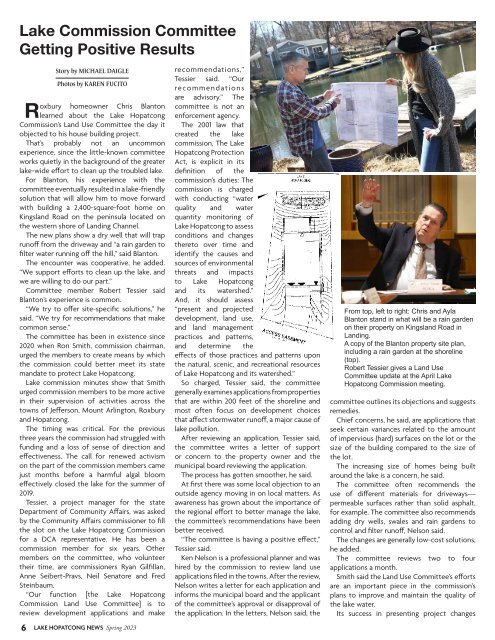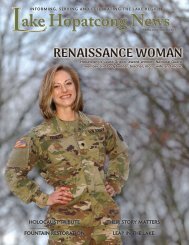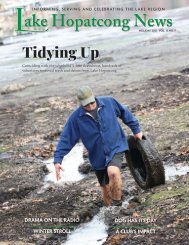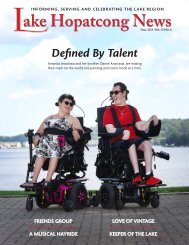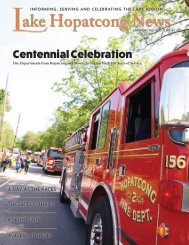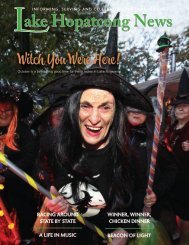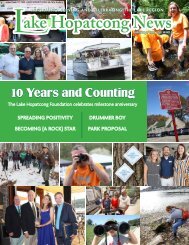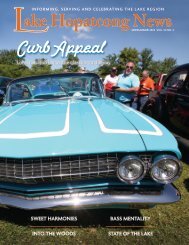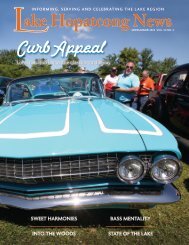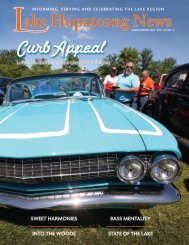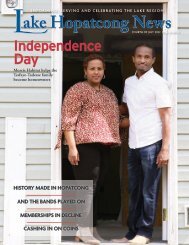Spring 2023 Issue
You also want an ePaper? Increase the reach of your titles
YUMPU automatically turns print PDFs into web optimized ePapers that Google loves.
Lake Commission Committee<br />
Getting Positive Results<br />
6<br />
Story by MICHAEL DAIGLE<br />
Photos by KAREN FUCITO<br />
Roxbury homeowner Chris Blanton<br />
learned about the Lake Hopatcong<br />
Commission’s Land Use Committee the day it<br />
objected to his house building project.<br />
That’s probably not an uncommon<br />
experience, since the little-known committee<br />
works quietly in the background of the greater<br />
lake-wide effort to clean up the troubled lake.<br />
For Blanton, his experience with the<br />
committee eventually resulted in a lake-friendly<br />
solution that will allow him to move forward<br />
with building a 2,400-square-foot home on<br />
Kingsland Road on the peninsula located on<br />
the western shore of Landing Channel.<br />
The new plans show a dry well that will trap<br />
runoff from the driveway and “a rain garden to<br />
filter water running off the hill,” said Blanton.<br />
The encounter was cooperative, he added.<br />
“We support efforts to clean up the lake, and<br />
we are willing to do our part.”<br />
Committee member Robert Tessier said<br />
Blanton’s experience is common.<br />
“We try to offer site-specific solutions,” he<br />
said. “We try for recommendations that make<br />
common sense.”<br />
The committee has been in existence since<br />
2020 when Ron Smith, commission chairman,<br />
urged the members to create means by which<br />
the commission could better meet its state<br />
mandate to protect Lake Hopatcong.<br />
Lake commission minutes show that Smith<br />
urged commission members to be more active<br />
in their supervision of activities across the<br />
towns of Jefferson, Mount Arlington, Roxbury<br />
and Hopatcong.<br />
The timing was critical. For the previous<br />
three years the commission had struggled with<br />
funding and a loss of sense of direction and<br />
effectiveness. The call for renewed activism<br />
on the part of the commission members came<br />
just months before a harmful algal bloom<br />
effectively closed the lake for the summer of<br />
2019.<br />
Tessier, a project manager for the state<br />
Department of Community Affairs, was asked<br />
by the Community Affairs commissioner to fill<br />
the slot on the Lake Hopatcong Commission<br />
for a DCA representative. He has been a<br />
commission member for six years. Other<br />
members on the committee, who volunteer<br />
their time, are commissioners Ryan Gilfillan,<br />
Anne Seibert-Pravs, Neil Senatore and Fred<br />
Steinbaum.<br />
“Our function [the Lake Hopatcong<br />
Commission Land Use Committee] is to<br />
review development applications and make<br />
LAKE HOPATCONG NEWS <strong>Spring</strong> <strong>2023</strong><br />
recommendations,”<br />
Tessier said. “Our<br />
recommendations<br />
are advisory.” The<br />
committee is not an<br />
enforcement agency.<br />
The 2001 law that<br />
created the lake<br />
commission, The Lake<br />
Hopatcong Protection<br />
Act, is explicit in its<br />
definition of the<br />
commission’s duties: The<br />
commission is charged<br />
with conducting “water<br />
quality and water<br />
quantity monitoring of<br />
Lake Hopatcong to assess<br />
conditions and changes<br />
thereto over time and<br />
identify the causes and<br />
sources of environmental<br />
threats and impacts<br />
to Lake Hopatcong<br />
and its watershed.”<br />
And, it should assess<br />
“present and projected<br />
development, land use,<br />
and land management<br />
practices and patterns,<br />
and determine the<br />
effects of those practices and patterns upon<br />
the natural, scenic, and recreational resources<br />
of Lake Hopatcong and its watershed.”<br />
So charged, Tessier said, the committee<br />
generally examines applications from properties<br />
that are within 200 feet of the shoreline and<br />
most often focus on development choices<br />
that affect stormwater runoff, a major cause of<br />
lake pollution.<br />
After reviewing an application, Tessier said,<br />
the committee writes a letter of support<br />
or concern to the property owner and the<br />
municipal board reviewing the application.<br />
The process has gotten smoother, he said.<br />
At first there was some local objection to an<br />
outside agency moving in on local matters. As<br />
awareness has grown about the importance of<br />
the regional effort to better manage the lake,<br />
the committee’s recommendations have been<br />
better received.<br />
“The committee is having a positive effect,”<br />
Tessier said.<br />
Ken Nelson is a professional planner and was<br />
hired by the commission to review land use<br />
applications filed in the towns. After the review,<br />
Nelson writes a letter for each application and<br />
informs the municipal board and the applicant<br />
of the committee’s approval or disapproval of<br />
the application. In the letters, Nelson said, the<br />
From top, left to right: Chris and Ayla<br />
Blanton stand in what will be a rain garden<br />
on their property on Kingsland Road in<br />
Landing.<br />
A copy of the Blanton property site plan,<br />
including a rain garden at the shoreline<br />
(top).<br />
Robert Tessier gives a Land Use<br />
Committee update at the April Lake<br />
Hopatcong Commission meeting.<br />
committee outlines its objections and suggests<br />
remedies.<br />
Chief concerns, he said, are applications that<br />
seek certain variances related to the amount<br />
of impervious (hard) surfaces on the lot or the<br />
size of the building compared to the size of<br />
the lot.<br />
The increasing size of homes being built<br />
around the lake is a concern, he said.<br />
The committee often recommends the<br />
use of different materials for driveways—<br />
permeable surfaces rather than solid asphalt,<br />
for example. The committee also recommends<br />
adding dry wells, swales and rain gardens to<br />
control and filter runoff, Nelson said.<br />
The changes are generally low-cost solutions,<br />
he added.<br />
The committee reviews two to four<br />
applications a month.<br />
Smith said the Land Use Committee’s efforts<br />
are an important piece in the commission’s<br />
plans to improve and maintain the quality of<br />
the lake water.<br />
Its success in presenting project changes


